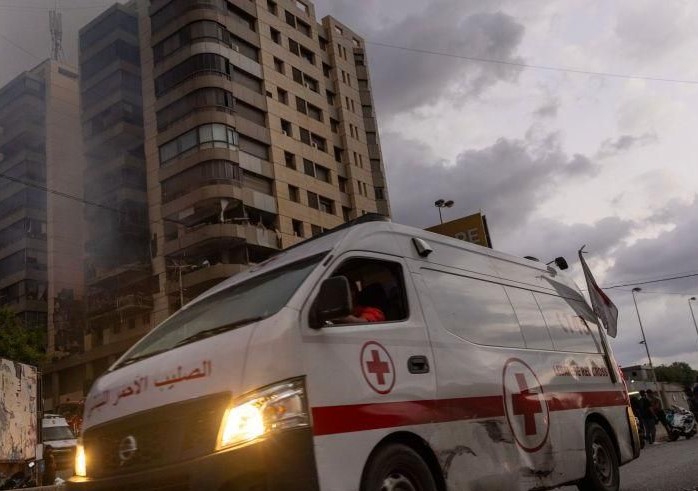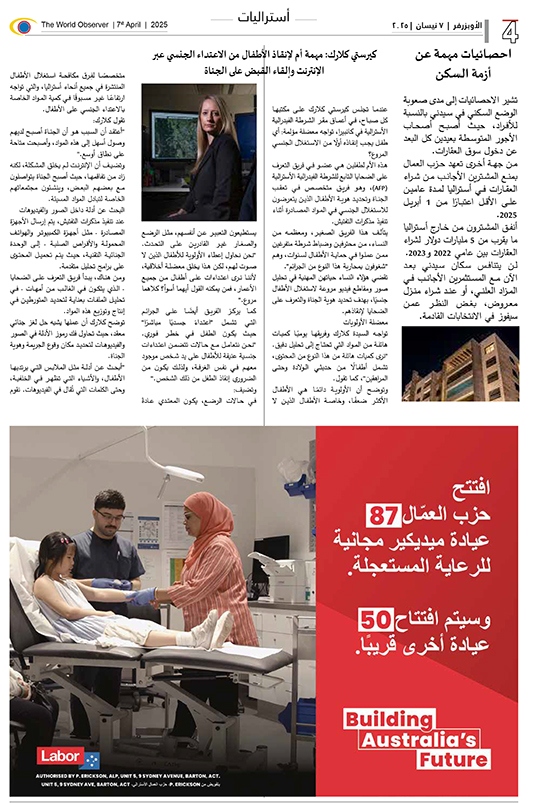
Lebanon’s civil defence department says five of its emergency workers have been killed by an Israeli air strike in the country’s south.
The deaths follow a number of incidents in which Lebanese firefighters and paramedics claim they have been fired upon, or warned by the Israeli military not to rescue people or put out fires caused by bombing.
Israeli and Hezbollah ground forces have been engaging in fierce battles after Israel launched a ground invasion last month.
Hezbollah and Israel have been trading rocket fire since the Gaza war erupted after the Hamas-led terrorist attack on Israel a year ago.
Since then, tens of thousands of people on both sides of the border were displaced.
As the conflict escalates, nearly 1 million people in Lebanon have fled their homes.
The Lebanese civil defence department said the emergency workers were killed in an air strike on their base in the village of Derdghaiyah, “where they were on stand-by to meet relief calls for their national and humanitarian duty”.
Israel said it has been striking infrastructure of the militant group Hezbollah, but fire and rescue teams say the Israeli threats are making the impact of the strikes worse and leading to more deaths.
Rescuers say their work is interrupted
Most of Israel’s strikes in Beirut have been in the southern suburbs, an area known as Dahiyeh.
The southern district’s fire and rescue commander, Saad al Ahmar, said his teams often receive calls from the Israeli military telling them to withdraw before they can finish their work.
Saad al Ahmar is the southern district of Beirut’s fire and rescue commander.
“At certain moments we received several phone calls from the Israeli enemy warning us when we are working in a certain place to ‘remove your guys from there because we are going to strike them’,” he said.
“We try to stay a bit longer to try to rescue as many poor civilians as we can and put out the fire. Then we will get another phone call saying, ‘if you are stubborn and don’t leave, we will bomb you’.”
The brigade has had one firefighter die after inhaling toxic gas while trying to save a man trapped in a building.
Saad al Ahmar says Israeli threats are making it more difficult to save lives and property.
“It takes us some time to leave when they warn us, and then we return to find there are many huge disasters,” he said.
Mr al Ahmar was a senior firefighter during the last war between Hezbollah and Israel in 2006, but said he’s never experienced conditions like the current bombardment.
“The scale of destruction that’s happening is much greater,” he said.
“More than one building is being destroyed at a time … we are not able to put it out or contain it because of what’s inside of the bombs. We don’t know what they are using.”
Israel claims to have destroyed a number of Hezbollah weapons facilities, which it says were located underground in residential areas.
Lebanese paramedics say they live in fear
Paramedics are also reporting being fired upon, or being told to withdraw before they can pick up casualties.
The director of the Lebanese Red Cross, Kassem Shaalan, said paramedics were nearly hit by an air strike that killed soldiers from Lebanon’s Armed Forces, which are not fighting Israel.
Kassem Shaalan is the director of the Lebanese Red Cross.
“There were two convoys for the Red Cross, [which had] missiles close to them, not a direct hit,” he said.
“One of the missiles [hit] close to the Red Cross, while we were doing evacuation and we had another convoy for the Lebanese Armed Forces where two [people] died.”
Mr Shaalan said Red Cross paramedics, who are volunteers, must be protected and allowed to provide medical care, as stated under the Geneva Conventions.
“Our key message is really, to respect the Geneva Conventions,” he said.
“Civilians, they are not part of the conflict, they are not part of the war, so we need to protect civilians, we need to protect all the health workers in order to do their job safely, to help everyone.”
Israel’s military has previously accused one paramedic organisation — not the Red Cross — of transporting weapons for Hezbollah.
“In recent days, we have observed the increasing exploitation of rescue vehicles by Hezbollah elements to transport saboteurs and combat equipment,” the Israel Defense Force’s Arabic spokesperson Avichay Adree wrote on social media.
“The IDF warns of the repercussions of the continuation of this phenomenon, calling on medical teams to stay away from Hezbollah elements and not to cooperate with them.
“Any vehicle proven to have an armed saboteur using it for terrorist purposes, regardless of its type, will be subject to appropriate measures to prevent its military use.”
The ABC asked the IDF whether it was firing on emergency workers and forcing them to withdraw from impact sites, but is yet to receive a response.






































 The World Observer Media produces a daily online newspaper, a daily Arabic online newspaper and a monthly printed Arabic/English magazine and a weekly printed Arabic/English newspaper.
The World Observer Media’s mission is to entertain and educate all generation from the Ethnic Communities in Australia, who are interested in local, national and foreign information.
The World Observer Media produces a daily online newspaper, a daily Arabic online newspaper and a monthly printed Arabic/English magazine and a weekly printed Arabic/English newspaper.
The World Observer Media’s mission is to entertain and educate all generation from the Ethnic Communities in Australia, who are interested in local, national and foreign information. 


